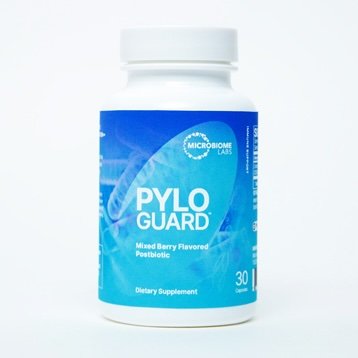PyloGuard
Clinical studies show PyloGuard™ supports managing H. pylori levels, particularly when used with antibiotics. It contains patented Lactobacillus reuteri DSM17648, which can attract specific organisms in the intestine and support their removal via the digestive tract. This particular strain of L. reuteri maintains H. pylori levels already within the normal range and supports overall digestive health.
Key Benefits:
Supports bacteria levels in the stomach
Promotes the body’s process of elimination
Supports the microbiome
Maintains H pylori levels already within the normal range
Key Features:
Lactobacillus reuteri DSM17648 culture containing ≥ 1 x1011 inactivated cells/gram
Produced in a low-temperature fermentation & drying process to avoid denaturing
Stable under the gastric conditions
Doesn’t disturb the gut microbial balance
Formulated in a free-flowing, spray-dried powder format
Stable at room temperature
Backed by in vitro and in vivo scientific research
Safe for long-term daily use (QPS, MIC, GRAS)
Produced and tested to exceed the most stringent EU quality standards (ISO)
Free from GMO, lactose, and fructose
Clinical studies show PyloGuard™ supports managing H. pylori levels, particularly when used with antibiotics. It contains patented Lactobacillus reuteri DSM17648, which can attract specific organisms in the intestine and support their removal via the digestive tract. This particular strain of L. reuteri maintains H. pylori levels already within the normal range and supports overall digestive health.
Key Benefits:
Supports bacteria levels in the stomach
Promotes the body’s process of elimination
Supports the microbiome
Maintains H pylori levels already within the normal range
Key Features:
Lactobacillus reuteri DSM17648 culture containing ≥ 1 x1011 inactivated cells/gram
Produced in a low-temperature fermentation & drying process to avoid denaturing
Stable under the gastric conditions
Doesn’t disturb the gut microbial balance
Formulated in a free-flowing, spray-dried powder format
Stable at room temperature
Backed by in vitro and in vivo scientific research
Safe for long-term daily use (QPS, MIC, GRAS)
Produced and tested to exceed the most stringent EU quality standards (ISO)
Free from GMO, lactose, and fructose
Clinical studies show PyloGuard™ supports managing H. pylori levels, particularly when used with antibiotics. It contains patented Lactobacillus reuteri DSM17648, which can attract specific organisms in the intestine and support their removal via the digestive tract. This particular strain of L. reuteri maintains H. pylori levels already within the normal range and supports overall digestive health.
Key Benefits:
Supports bacteria levels in the stomach
Promotes the body’s process of elimination
Supports the microbiome
Maintains H pylori levels already within the normal range
Key Features:
Lactobacillus reuteri DSM17648 culture containing ≥ 1 x1011 inactivated cells/gram
Produced in a low-temperature fermentation & drying process to avoid denaturing
Stable under the gastric conditions
Doesn’t disturb the gut microbial balance
Formulated in a free-flowing, spray-dried powder format
Stable at room temperature
Backed by in vitro and in vivo scientific research
Safe for long-term daily use (QPS, MIC, GRAS)
Produced and tested to exceed the most stringent EU quality standards (ISO)
Free from GMO, lactose, and fructose
What is Helicobacter Pylori?
Helicobacter pylori (H. pylori) is a gram-negative, spiral-shaped bacterium native to the human gastrointestinal (GI) tract. It has an affinity for the acidic environment of the gastric mucosa. Estimates say that up to 50% of the world’s population carries H. pylori in their GI tracts. H. pylori is spread through direct contact with individuals or household pets through saliva, feces, or contaminated food or water.
Humanity’s relationship with H. pylori is ambiguous. H. pylori can have a commensal or symbiotic relationship with its human host.
H. pylori colonizes and multiplies in the duodenum and gastric mucosa, secreting urease, the enzyme that converts urea to ammonia. Alkaline ammonia buffers the naturally low pH of the stomach, providing the optimal environment for H. pylori to live.
Disruption of the microbiome can cause occasional:
Nausea
Heartburn
Loss of appetite
Dyspepsia


